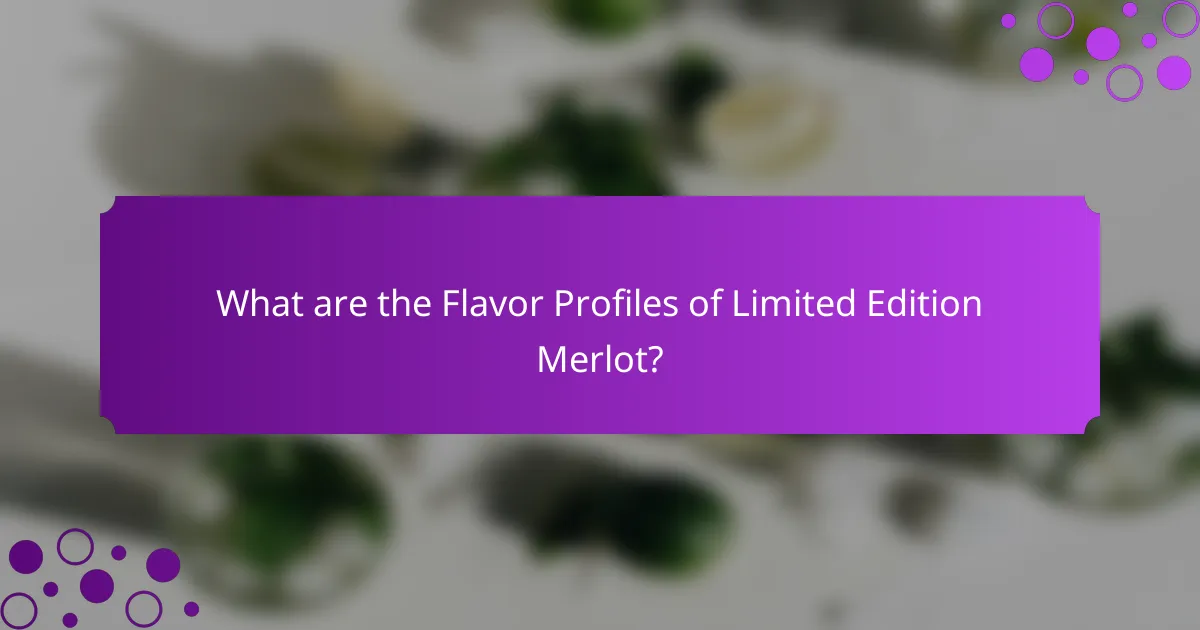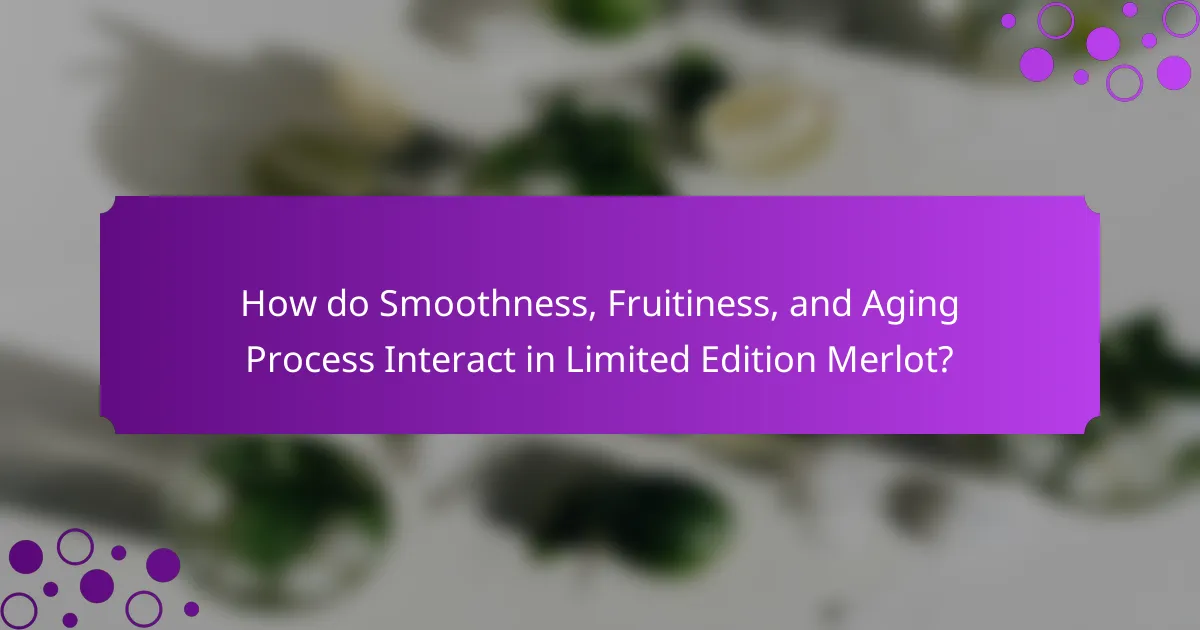
What are the Flavor Profiles of Limited Edition Merlot?
Limited edition Merlot typically features rich and complex flavor profiles. Common notes include dark fruits like black cherry, plum, and blackberry. These fruits contribute to the wine’s smoothness and depth. Additionally, limited edition Merlots often exhibit hints of chocolate, vanilla, and spice. These flavors result from oak aging, which enhances the wine’s richness. The tannins in these wines are usually soft and well-integrated, providing a velvety mouthfeel. The aging process can also introduce earthy and herbal undertones. Overall, the flavor profile is a harmonious blend of fruitiness and subtle complexity.
How does Smoothness manifest in Limited Edition Merlot?
Smoothness in Limited Edition Merlot is characterized by a velvety texture and refined mouthfeel. This quality is achieved through the careful selection of grapes and meticulous winemaking techniques. The aging process in oak barrels contributes to the integration of tannins, resulting in a softer palate. Limited Edition Merlot often showcases a balance between acidity and sweetness, enhancing its smooth profile. Additionally, the wine’s fruit flavors, such as plum or cherry, are expressed without harshness. Aged Merlot typically exhibits less astringency, allowing for a smoother finish. Overall, the combination of grape variety, aging, and production methods creates a harmonious drinking experience.
What factors contribute to the smoothness of Limited Edition Merlot?
The smoothness of Limited Edition Merlot is influenced by several key factors. One significant factor is the grape variety used. Merlot grapes are known for their soft tannins, which contribute to a smoother mouthfeel. Another factor is the winemaking process. Techniques such as gentle pressing and controlled fermentation help preserve the wine’s delicate characteristics.
Aging also plays a crucial role. Limited Edition Merlot is often aged in oak barrels, which can enhance smoothness through the integration of flavors and tannin softening. The duration of aging is important; longer aging periods typically result in a more refined texture.
The region where the grapes are grown affects smoothness as well. Cooler climates tend to produce grapes with balanced acidity and lower tannin levels, enhancing the wine’s smoothness. Lastly, the winemaker’s skill in blending different batches can create a harmonious balance, further contributing to the overall smoothness of the wine.
How does the smoothness affect the overall tasting experience?
Smoothness significantly enhances the overall tasting experience of Merlot. A smooth texture allows the wine to glide effortlessly across the palate. This quality reduces harshness and bitterness, making the wine more enjoyable. Smooth wines often have well-integrated tannins, contributing to a balanced flavor profile. Furthermore, smoothness can elevate the perception of fruitiness in the wine. It allows the nuanced flavors to emerge without being overshadowed by astringency. Research indicates that smoother wines are generally preferred in tasting evaluations. A study by the American Journal of Enology and Viticulture found that smoothness correlates with higher overall ratings among consumers.
What role does Fruitiness play in Limited Edition Merlot?
Fruitiness in Limited Edition Merlot significantly enhances its flavor profile. It contributes to the wine’s overall aroma and taste. Common fruity notes include blackberry, cherry, and plum. These flavors create a sense of richness and complexity. The balance of fruitiness can indicate the wine’s ripeness and quality. Additionally, fruitiness often correlates with the wine’s aging potential. Studies have shown that fruit-forward wines are generally more appealing to consumers. This makes fruitiness a key attribute in the marketability of Limited Edition Merlot.
Which fruit flavors are commonly found in Limited Edition Merlot?
Common fruit flavors found in Limited Edition Merlot include blackberry, plum, and cherry. These flavors contribute to the wine’s rich and fruity profile. Blackberry offers a deep, dark fruit essence. Plum adds a juicy, sweet component. Cherry provides a bright, tart contrast. These flavors are often enhanced by oak aging, which can introduce notes of vanilla and spice. This combination creates a complex and enjoyable tasting experience.
How do the fruit flavors evolve with aging?
Fruit flavors in Merlot evolve significantly with aging. Initially, young Merlot presents vibrant fruit notes like cherry and plum. As the wine ages, these primary fruit flavors soften and integrate. Secondary flavors, such as dried fruit and fig, emerge over time. The aging process also allows for the development of tertiary flavors, including leather and tobacco. This transformation occurs due to chemical reactions within the wine. Oxidation and esterification contribute to the complexity of flavors. Studies indicate that optimal aging can enhance the wine’s overall balance and smoothness. As a result, aged Merlot often exhibits a more nuanced and layered flavor profile.
What insights can we gain from the Aging Process of Limited Edition Merlot?
The aging process of limited edition Merlot enhances its complexity and flavor profile. As Merlot ages, tannins soften, resulting in a smoother mouthfeel. This process also allows for the development of secondary flavors, such as earthiness and spice. The interaction with oak barrels introduces notes of vanilla and toast. Additionally, aging can lead to a reduction in fruitiness, shifting the profile towards more savory elements. Studies indicate that optimal aging can last from 5 to 10 years, depending on the specific vintage. The terroir and winemaking techniques used also significantly influence the aging potential. These insights help consumers understand the value and characteristics of limited edition Merlot as it matures.
How does aging impact the flavor profile of Limited Edition Merlot?
Aging significantly enhances the flavor profile of Limited Edition Merlot. It allows complex flavors to develop over time. As Merlot ages, tannins soften, resulting in a smoother mouthfeel. The fruitiness often evolves from fresh berry notes to deeper, more nuanced flavors like plum and chocolate. Aging also introduces secondary flavors from oak barrels, such as vanilla and spice. This process can take several years, with optimal aging typically around 5 to 10 years. Studies show that aged wines often achieve greater balance and depth. The interaction with oxygen during aging contributes to these changes, making the wine more enjoyable.
What are the ideal aging conditions for Limited Edition Merlot?
Limited Edition Merlot ideally ages in a cool, dark environment. The optimal temperature range is between 55°F to 65°F. Humidity levels should be around 60% to 70% to prevent cork drying. Bottles should be stored horizontally to keep the cork moist. Minimal light exposure helps preserve the wine’s quality. Vibration-free storage is essential to avoid disrupting sediment. Aging in these conditions can enhance flavor complexity and smoothness. Research indicates that proper aging can improve Merlot’s tannin structure and overall balance.

How do Smoothness, Fruitiness, and Aging Process Interact in Limited Edition Merlot?
Smoothness, fruitiness, and the aging process significantly interact in limited edition Merlot. Smoothness often results from tannin management during winemaking. Tannins can soften over time, contributing to a velvety mouthfeel. Fruitiness is derived from the grape variety and fermentation process. Limited edition Merlots typically emphasize ripe fruit flavors, enhancing their appeal. The aging process influences both smoothness and fruitiness. Oak aging can impart additional flavors, such as vanilla and spice, while also softening tannins. This combination creates a harmonious balance in flavor profiles. Studies show that well-aged Merlots exhibit more complexity and integration of flavors. Therefore, the interplay of these attributes defines the quality of limited edition Merlot.
Why is the balance of these attributes important?
The balance of attributes in limited edition Merlot, such as smoothness, fruitiness, and aging process, is crucial for creating a harmonious flavor profile. Each attribute contributes uniquely to the overall tasting experience. Smoothness provides a pleasant mouthfeel, enhancing drinkability. Fruitiness adds complexity and depth, appealing to a wider audience. The aging process influences the development of flavors, integrating oak and tannins. A well-balanced Merlot ensures that no single attribute overpowers the others. This balance is essential for achieving a refined and enjoyable wine. Studies show that wines with balanced attributes are more likely to receive higher ratings from sommeliers and consumers alike.
How does the interplay of smoothness and fruitiness enhance the tasting experience?
The interplay of smoothness and fruitiness significantly enhances the tasting experience of Merlot. Smoothness provides a velvety texture that allows the palate to appreciate flavors without harshness. This characteristic softens the impact of tannins, making the wine more approachable. Fruitiness introduces vibrant flavors, such as cherry and plum, which add complexity. The combination of these elements creates a harmonious balance. Smoothness allows the fruit flavors to shine without being overshadowed. This balance results in a more enjoyable and memorable tasting experience. Studies show that smooth wines are often rated higher in overall enjoyment.
What happens when the aging process alters these attributes?
Aging alters the attributes of limited edition Merlot, specifically smoothness and fruitiness. As Merlot ages, tannins soften, leading to increased smoothness. This transformation occurs due to chemical reactions that reduce astringency. The flavor profile also evolves, often resulting in diminished fruitiness. Fresh fruit notes may fade, replaced by complex flavors like earthiness or spice. Research indicates that aging can enhance aromatic compounds, adding depth. A study by the University of California found that prolonged aging can improve overall wine quality. This demonstrates how the aging process significantly impacts Merlot’s flavor attributes.

What are the Best Practices for Enjoying Limited Edition Merlot?
To enjoy limited edition Merlot, start by selecting the right glass. A large, tulip-shaped glass enhances the wine’s aromas. Next, serve the Merlot at optimal temperature, ideally between 60-65°F. This temperature allows the flavors to be fully expressed.
Decanting the wine can also improve its taste. Pouring it into a decanter exposes it to oxygen, softening tannins and enhancing complexity. Allow the Merlot to breathe for at least 30 minutes before tasting.
When tasting, take small sips to appreciate the smoothness and fruitiness. Note the flavor profiles, which may include dark fruits, chocolate, or spice. Pair the wine with complementary foods, such as red meats or rich cheeses.
Finally, store any remaining wine properly. Use a cork and keep it in a cool, dark place. Following these practices will enhance your experience with limited edition Merlot.
How should Limited Edition Merlot be served for optimal flavor?
Limited Edition Merlot should be served slightly chilled, ideally at a temperature between 60°F and 65°F. This temperature range enhances the wine’s fruitiness and smoothness. Pour the Merlot into a clean, wide-bowled glass to allow for proper aeration. Swirling the wine in the glass releases its aromatic compounds, improving the overall tasting experience.
Pairing Limited Edition Merlot with complementary foods can also enhance its flavor profile. Rich cheeses, grilled meats, and dark chocolate are excellent choices. Additionally, allowing the wine to breathe for about 30 minutes before serving can further develop its flavors. This practice is supported by sommeliers who emphasize the importance of aeration in enhancing wine characteristics.
What glassware enhances the tasting experience of Limited Edition Merlot?
The best glassware for enhancing the tasting experience of Limited Edition Merlot is a Bordeaux glass. Bordeaux glasses are designed with a large bowl and a narrow rim. This shape allows for optimal aeration of the wine. The broad bowl encourages the release of the wine’s complex aromas. The narrow rim helps concentrate those aromas towards the nose. This enhances the overall sensory experience while tasting. Studies show that the right glassware can significantly affect wine perception. The Bordeaux glass is specifically suited for full-bodied reds like Merlot.
What food pairings complement the flavor profiles of Limited Edition Merlot?
Limited Edition Merlot pairs well with red meats, such as steak and lamb. The wine’s fruitiness complements the savory flavors of these dishes. Additionally, rich pasta dishes with creamy sauces enhance the smoothness of the Merlot. Grilled vegetables also provide a balanced contrast to its bold profile. Aged cheeses, like cheddar or gouda, match the wine’s complexity. Dark chocolate desserts offer a delightful finish alongside Merlot’s fruity notes. These pairings enhance the overall tasting experience of Limited Edition Merlot.
What tips can enhance the appreciation of Limited Edition Merlot?
To enhance the appreciation of Limited Edition Merlot, consider proper serving temperature. Serving Merlot slightly below room temperature, around 60-65°F, allows its flavors to shine. Use appropriate glassware, such as a large-bowled wine glass, to concentrate aromas. Swirling the wine releases its bouquet, enriching the tasting experience. Pairing with complementary foods, like grilled meats or rich cheeses, enhances flavor dynamics. Take time to savor each sip, focusing on the wine’s smoothness and fruitiness. Noting the aging process can deepen appreciation; many Limited Edition Merlots benefit from cellaring. Engaging in tastings or wine events can provide insights and broaden understanding of this varietal.
Limited Edition Merlot is the primary entity examined in this article, which explores its flavor profiles, focusing on smoothness, fruitiness, and the aging process. The article details how rich flavors from dark fruits, chocolate, and oak aging contribute to a velvety mouthfeel and overall complexity. Key factors influencing smoothness include grape variety, winemaking techniques, and aging conditions, while fruit flavors evolve over time, enhancing the wine’s appeal. Additionally, the interplay of these attributes is crucial for achieving a balanced and enjoyable tasting experience, supported by best practices for serving and pairing Limited Edition Merlot.